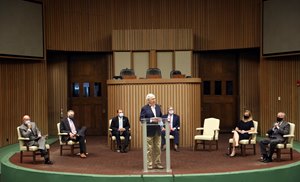Horseracing Integrity and Safety Act Poised to Advance


With the United States Senate including the Horseracing Integrity and Safety Act in an omnibus bill crafted around a funding package that would prevent a government shutdown, the industry landmark legislation that would overhaul oversight of racing's drug and medication rules and its equine drug testing appears poised to become reality.
Supporters of the Horseracing Integrity and Safety Act forwarded a Senate appropriations bill to BloodHorse that included the industry legislation. The Senate is expected to vote on the appropriatioins bill Dec. 21, according to muliple news outlets, as lawmakers will need to approve continued funding to prevent a government shutdown. Congress approved a two-day extension then one-day extension to keep the government running over the weekend.
The industry legislation already has been passed by the House of Reprsenatives.
After years of effort on similar bills that failed to advance, the U.S. House of Representatives approved the Horseracing Integrity and Safety Act Sept. 29. The legislation would see formation of the Horseracing Integrity and Safety Authority to oversee the sport's equine medication, anti-doping policies, and drug testing—taking that responsibility away from state regulators. The bill's supporters, including The Jockey Club, prominent track owners, and animal welfare groups, believe the new approach will improve integrity and uniformity in these areas.
The House action followed Senate Majority Leader Mitch McConnell (Republican, Kentucky) voicing his support for the legislation—with some tweaks—Aug. 31 at Keeneland. The House bill was updated to include those changes and approved about a month later.
The legislation on the Senate side included in the omnibus bill Monday has bipartisan support.
Under the new legislation, the Federal Trade Commission would have oversight of the authority and the United States Anti-Doping Agency would serve as the authority's enforcement arm.
Supporters of the bill, championed on the House side of Congress by Rep. Paul Tonko (Democrat, New York) and Rep. Andy Barr (Republican, Kentucky), believe the current state-to-state approach in regulating medication and drug testing has lacked uniformity, relies too much on post-race testing, and too often sees active participants—or people with close ties to the sport's participants—making decisions from their roles on regulatory boards.

"Congressman Tonko's Horseracing Integrity Act is about to become law as part of the year-end federal funding bill and COVID rescue package," Tonko's office said in a release Monday. "His bipartisan bill includes major industry-wide reforms tied to anti-doping and equine safety."
The Association of Racing Commissioners International, an umbrella group for state regulators, has raised questions about the costs of the change in regulation. It has called for specifics on how the new approach would impact small and mid-sized tracks financially.
The ARCI said it ultimately will work to ensure a smooth transition should the federal legislation be approved.
"This legislation accomplishes that and also solves the funding issue that has been an annual headache for every racing commission," said ARCI president Ed Martin.

